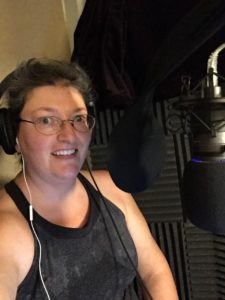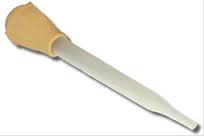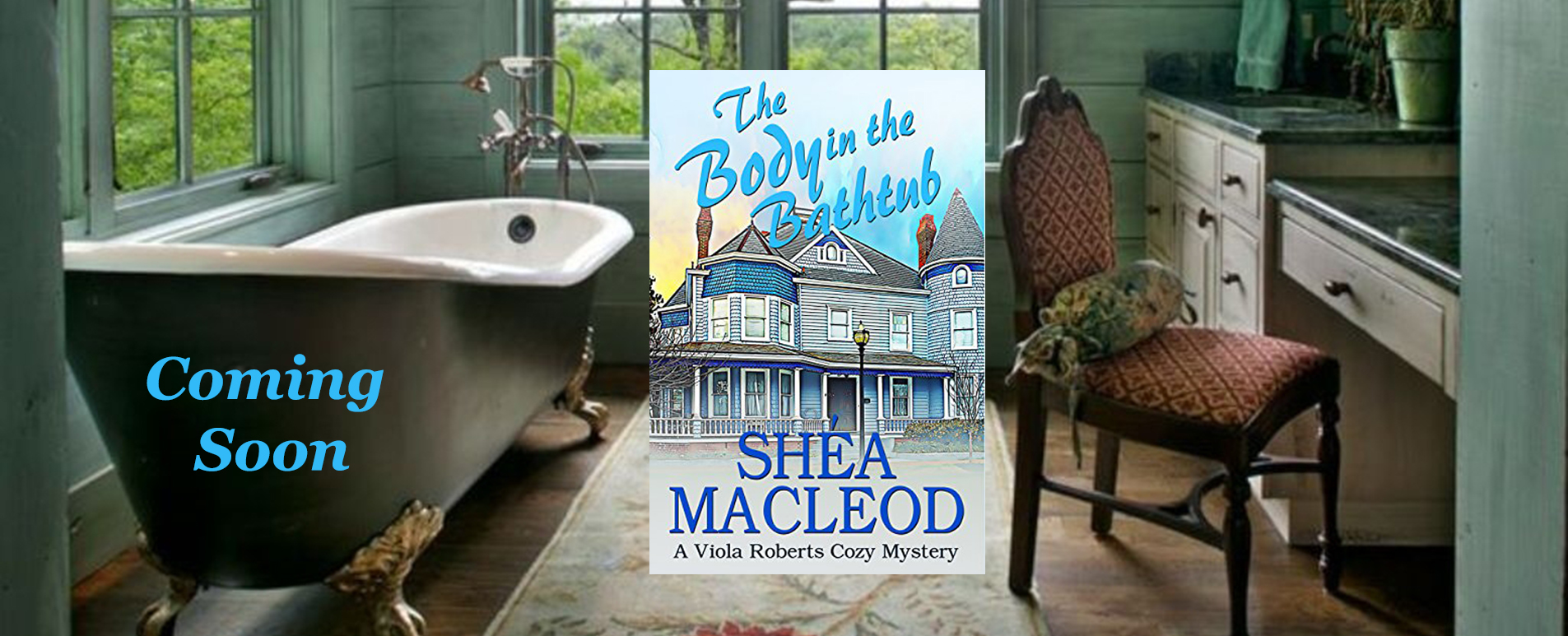
Recording for The Body in The Bathtub is well underway. With each book I record, I sincerely try to get better at the process. Farther away from mediocre. More on that later.
As I’ve written, before I started this latest book, I asked for some coaching from Kathy Garver. From her feedback, I picked six (of a million possible) tools and techniques to practice:
Tip #1 – GESTURES assigned to each character (in addition to voice placement, physicality, etc.) The idea here is that the gesture will remind me to QUICKLY access the character, as I switch back and forth during dialog.
Tip #2 – WARMUPS (for my jaw especially) to loosen up my physical performance.
Tip #3 – MOUTH OPEN & NOSE BREATHS are the next tips I am working on. With Kathy watching me, she could point out that I automatically close my mouth when I stop talking, instead of leaving it hanging open. That’s the sort of critically useful feedback a narrator needs and can’t really get working alone. Because I can’t see myself, I wasn’t aware that opening and closing my lips makes a teenie bit of noise. Noise I might be tempted to edit out. To avoid editing, I’m practicing leaving my mouth open when I’m recording, ready for the next line.
NOTE FOR MY FRIENDS: If you see me doing this at a party, please quote Mary Poppins at me under your breath: “Michael, we are not a codfish.”
Leaving my mouth gaping helps with breathing, though not strictly the nose breathing that Kathy recommended I try. For some reason, it is hard for me to breathe in through my nose when I am doing audiobook work. I have that amateur bad habit of sucking air deep into my lungs, which makes NOISE and has to be edited out (by me). That adds time and work. To reduce this, Kathy encouraged me to take little nose-breaths.
This is a bit of an issue, for several reasons. First, I broke my nose learning to ride a bike when I was a kid. I haven’t had it fixed, so my nasal passages are off-kilter. One works much better than the other, but even nose breaths make a little noise when I breathe, because of the blockage.
Second, I don’t get nearly as much air via my nose (I assume because of the deviated septum), and third, I have to really THINK about breathing that way. I’m training my body to do the opposite of what I previously trained it to do when learning to SCUBA dive. So in one lifetime, I have tried training myself to ONLY mouth-breathe, ONLY nose-breathe, and to circular-breathe (which I used to be able to do when I whistled).
I’m practicing the nose-breathing, but I do think it is adding time to my recording. Which is OK, I’m still learning, and I need to allow myself time (but I hope it isn’t TOO much time. I’ve got self-imposed deadlines).
Also, using my nose to breathe is hard because I usually use this amazing technique for breath support that I learned during a singing class. This video by Madeline Harvey helped me FINALLY understand that damn turkey-basting metaphor. HINT: It is about sucking in, not squeezing out.

If you truly use all of your breath and create a vacuum with your diaphragm, you can suck air in fully, quickly, and silently. This gives me HUGE air reserves, for very very very very very very very very long sentences, and reduces the total number of breaths I need.
Ultimately, as all of this technique settles in, I’ll just breathe however it is most comfortable. Until then, my audiobook recording is a lot about airflow.
Tip #4 – ATTITUDE is a quick way to get to characterization in a scene. Just asking “What is my character’s attitude?” is a helpful way to understand them and figure out what is happening…and therefore with their voice and dialog. I’ve learned this half-dozen times at least. Sadly for me, I’m an amateur and I honestly just forget to ask myself this question sometimes.
For at least 70% of the narration, I think it isn’t a big deal. I am reading words, with nice emphasis, and finding all the set-ups and punch lines. If my comedic timing is good, and every word is correct, and the dialog makes sense…that’s close enough, right?
Sure, if I want to STAY an amateur. But let’s face it, I want to be in the Audiobook Narration HALL OF FAME!!! (BTW, That doesn’t exist. Well, I don’t THINK it exists). Seriously, I want to be just as conscientious about creating great narration as I will someday be about writing great stories. As Monte Schultz said in his opening remarks to the Santa Barbara Writer’s Conference this week, “Why would someone choose to be mediocre?”
Uh. To pay the rent? Duh, Monte.
So yeah, I have permission from myself to be mediocre as long as I need to in order to pay my mortgage. I can be mediocre while I’m getting better because nobody can be immediately awesome the first time they try.
Though, only because I’m terribly honest, I will point out I was called “outstanding” in my very first audiobook. It’s good to remember there’s always someone out there whose itch you perfectly scratch, and Thank All The Gods For That!
NEXT POST:
Tip #5 – Character Sheets
Tip #6 – Through Line – Mystery!

What do you think?